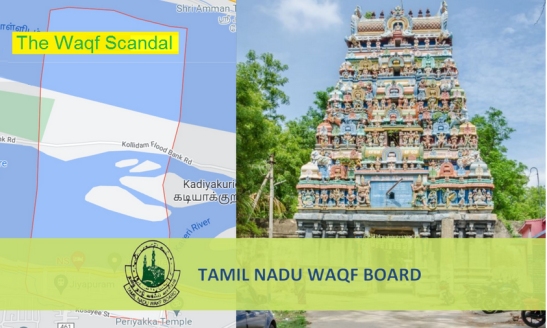
Chennai – The Tamil Nadu Waqf Board has claimed ownership of the entire village of Tiruchendurai in Tiruchirappalli District of the State. According to a report by the Tamil Daily ‘Dinamalar’, Rajagopal of Mullikarupur, who owned a farm in Tiruchendurai village had entered into an agreement to sell his 1 acre farm to Rajarajeshwari. In this connection, when he went to the registration office for the purchase deed of Rs 3,50,000, he was told by the Sub-Registrar that the sale deed cannot be registered since this land belonged to the Tamil Nadu Waqf Board. He said, “A No Objection Certificate will have to be obtained from the Tamil Nadu Waqf Board office in Chennai to sell the land”.
Rajagopal asked, “Is it necessary to get a No Objection Certificate from the Waqf Board to sell the land purchased in 1992 ?” The Sub-Registrar told him, “If any land purchase agreement is to be made in the Tiruchendurai village, the permission of the Waqf Board must be obtained. The Waqf Board has sent a letter to the Registration Department with documents stating that the entire village belongs to them and those who come to the office of Sub-Registrar to sell or buy land will have to take permission from the Board”. A copy of the 250-page letter from the Waqf Board in this regard was also shown to him. This letter says the Waqf Board claims that it owns thousands of acres of land in Tamil Nadu.
Tamil Nadu Waqf Board claims ownership of a Hindu-majority village, registrar asks villagers to obtain NOC from the board to sell their own landhttps://t.co/JDdQwJOzfd
— OpIndia.com (@OpIndia_com) September 12, 2022
What is the authority of the Waqf Board over a village with a majority of Hindus? – BJP
BJP leader Allur Prakash said, “Tiruchendurai is a picturesque agricultural village on the southern Banks of Cauvery River, where the majority are Hindus. What is the relationship between the Waqf Board and Tiruchendurai village ? The Manendiyavalli Sametha Chandrasekhar Swamy Temple in this village is 1,500 years old as per various documents and evidence. The Temple has 369 acres of land inside as well as outside the Tiruchendurai village. How can this temple land also belong to the Waqf Board ?
When a villager has land documents, how can the Waqf Board declare the property as its own without any proof ? Even if the Waqf Board has issued a letter claiming that the land belongs to it, how can the higher officials of the Registration Department order non-registration without verifying the claims of the Waqf Board ?”
| Editorial Viewpoint
Is there a Dravida Munnetra Kazhagam (DMK) party Government in Tamil Nadu or that of the Waqf Board ? |

 Death Drones to Strengthen Security in Maha Kumbha Area
Death Drones to Strengthen Security in Maha Kumbha Area Grand Gateway of ‘Kala Kumbha’
Grand Gateway of ‘Kala Kumbha’  Muslim Woman Becomes Her Husband’s Mother Due to ‘Halala’ with Her Father-in-Law
Muslim Woman Becomes Her Husband’s Mother Due to ‘Halala’ with Her Father-in-Law Cracks in the roof of the Shri Tuljabhawani Temple
Cracks in the roof of the Shri Tuljabhawani Temple Preparation for Maha Kumbha Mela is going on at high pace
Preparation for Maha Kumbha Mela is going on at high pace Chief Minister Yogi Adityanath reviews preparations for the Maha Kumbha by visiting 13 Akhadas
Chief Minister Yogi Adityanath reviews preparations for the Maha Kumbha by visiting 13 Akhadas